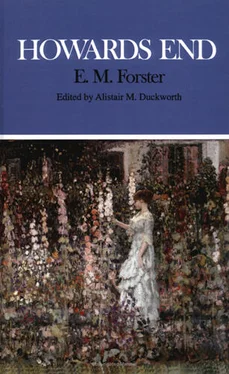Edward Morgan Forster - Howards End
Здесь есть возможность читать онлайн «Edward Morgan Forster - Howards End» весь текст электронной книги совершенно бесплатно (целиком полную версию без сокращений). В некоторых случаях можно слушать аудио, скачать через торрент в формате fb2 и присутствует краткое содержание. Жанр: Классическая проза, на английском языке. Описание произведения, (предисловие) а так же отзывы посетителей доступны на портале библиотеки ЛибКат.
- Название:Howards End
- Автор:
- Жанр:
- Год:неизвестен
- ISBN:нет данных
- Рейтинг книги:3 / 5. Голосов: 1
-
Избранное:Добавить в избранное
- Отзывы:
-
Ваша оценка:
- 60
- 1
- 2
- 3
- 4
- 5
Howards End: краткое содержание, описание и аннотация
Предлагаем к чтению аннотацию, описание, краткое содержание или предисловие (зависит от того, что написал сам автор книги «Howards End»). Если вы не нашли необходимую информацию о книге — напишите в комментариях, мы постараемся отыскать её.
Howards End — читать онлайн бесплатно полную книгу (весь текст) целиком
Ниже представлен текст книги, разбитый по страницам. Система сохранения места последней прочитанной страницы, позволяет с удобством читать онлайн бесплатно книгу «Howards End», без необходимости каждый раз заново искать на чём Вы остановились. Поставьте закладку, и сможете в любой момент перейти на страницу, на которой закончили чтение.
Интервал:
Закладка:
"I'm afraid this isn't what we meant," she began. "Mr. Wilcox and I never intended the cases to be touched. For instance, these books are my brother's. We are storing them for him and for my sister, who is abroad. When you kindly undertook to look after things, we never expected you to do so much."
"The house has been empty long enough," said the old woman.
Margaret refused to argue. "I dare say we didn't explain," she said civilly. "It has been a mistake, and very likely our mistake."
"Mrs. Wilcox, it has been mistake upon mistake for fifty years. The house is Mrs. Wilcox's, and she would not desire it to stand empty any longer."
To help the poor decaying brain, Margaret said:
"Yes, Mrs. Wilcox's house, the mother of Mr. Charles."
"Mistake upon mistake," said Miss Avery. "Mistake upon mistake."
"Well, I don't know," said Margaret, sitting down in one of her own chairs. "I really don't know what's to be done." She could not help laughing.
The other said: "Yes, it should be a merry house enough."
"I don't know—I dare say. Well, thank you very much, Miss Avery. Yes, that's all right. Delightful."
"There is still the parlour." She went through the door opposite and drew a curtain. Light flooded the drawing-room and the drawing-room furniture from Wickham Place. "And the dining-room." More curtains were drawn, more windows were flung open to the spring. "Then through here—" Miss Avery continued passing and repassing through the hall. Her voice was lost, but Margaret heard her pulling up the kitchen blind. "I've not finished here yet," she announced, returning. "There's still a deal to do. The farm lads will carry your great wardrobes upstairs, for there is no need to go into expense at Hilton."
"It is all a mistake," repeated Margaret, feeling that she must put her foot down. "A misunderstanding. Mr. Wilcox and I are not going to live at Howards End."
"Oh, indeed. On account of his hay fever?"
"We have settled to build a new home for ourselves in Sussex, and part of this furniture—my part—will go down there presently." She looked at Miss Avery intently, trying to understand the kink in her brain. Here was no maundering old woman. Her wrinkles were shrewd and humorous. She looked capable of scathing wit and also of high but unostentatious nobility.
"You think that you won't come back to live here, Mrs. Wilcox, but you will."
"That remains to be seen," said Margaret, smiling. "We have no intention of doing so for the present. We happen to need a much larger house. Circumstances oblige us to give big parties. Of course, some day—one never knows, does one?"
Miss Avery retorted: "Some day! Tcha! tcha! Don't talk about some day. You are living here now."
"Am I?"
"You are living here, and have been for the last ten minutes, if you ask me."
It was a senseless remark, but with a queer feeling of disloyalty Margaret rose from her chair. She felt that Henry had been obscurely censured. They went into the dining-room, where the sunlight poured in upon her mother's chiffonier, and upstairs, where many an old god peeped from a new niche. The furniture fitted extraordinarily well. In the central room—over the hall, the room that Helen had slept in four years ago—Miss Avery had placed Tibby's old bassinette.
"The nursery," she said.
Margaret turned away without speaking.
At last everything was seen. The kitchen and lobby were still stacked with furniture and straw, but, as far as she could make out, nothing had been broken or scratched. A pathetic display of ingenuity! Then they took a friendly stroll in the garden. It had gone wild since her last visit. The gravel sweep was weedy, and grass had sprung up at the very jaws of the garage. And Evie's rockery was only bumps. Perhaps Evie was responsible for Miss Avery's oddness. But Margaret suspected that the cause lay deeper, and that the girl's silly letter had but loosed the irritation of years.
"It's a beautiful meadow," she remarked. It was one of those open-air drawing-rooms that have been formed, hundreds of years ago, out of the smaller fields. So the boundary hedge zigzagged down the hill at right angles, and at the bottom there was a little green annex—a sort of powder-closet for the cows.
"Yes, the maidy's well enough," said Miss Avery, "for those that is, who don't suffer from sneezing." And she cackled maliciously. "I've seen Charlie Wilcox go out to my lads in hay time—oh, they ought to do this—they mustn't do that—he'd learn them to be lads. And just then the tickling took him. He has it from his father, with other things. There's not one Wilcox that can stand up against a field in June—I laughed fit to burst while he was courting Ruth."
"My brother gets hay fever too," said Margaret.
"This house lies too much on the land for them. Naturally, they were glad enough to slip in at first. But Wilcoxes are better than nothing, as I see you've found."
Margaret laughed.
"They keep a place going, don't they? Yes, it is just that."
"They keep England going, it is my opinion."
But Miss Avery upset her by replying: "Ay, they breed like rabbits. Well, well, it's a funny world. But He who made it knows what He wants in it, I suppose. If Mrs. Charlie is expecting her fourth, it isn't for us to repine."
"They breed and they also work," said Margaret, conscious of some invitation to disloyalty, which was echoed by the very breeze and by the songs of the birds. "It certainly is a funny world, but so long as men like my husband and his sons govern it, I think it'll never be a bad one—never really bad."
"No, better'n nothing," said Miss Avery, and turned to the wych-elm.
On their way back to the farm she spoke of her old friend much more clearly than before. In the house Margaret had wondered whether she quite distinguished the first wife from the second. Now she said: "I never saw much of Ruth after her grandmother died, but we stayed civil. It was a very civil family. Old Mrs. Howard never spoke against anybody, nor let anyone be turned away without food. Then it was never 'Trespassers will be prosecuted' in their land, but would people please not come in. Mrs. Howard was never created to run a farm."
"Had they no men to help them?" Margaret asked.
Miss Avery replied: "Things went on until there were no men."
"Until Mr. Wilcox came along," corrected Margaret, anxious that her husband should receive his dues.
"I suppose so; but Ruth should have married a—no disrespect to you to say this, for I take it you were intended to get Wilcox any way, whether she got him first or no."
"Whom should she have married?"
"A soldier!" exclaimed the old woman. "Some real soldier."
Margaret was silent. It was a criticism of Henry's character far more trenchant than any of her own. She felt dissatisfied.
"But that's all over," she went on. "A better time is coming now, though you've kept me long enough waiting. In a couple of weeks I'll see your lights shining through the hedge of an evening. Have you ordered in coals?"
"We are not coming," said Margaret firmly. She respected Miss Avery too much to humour her. "No. Not coming. Never coming. It has all been a mistake. The furniture must be repacked at once, and I am very sorry but I am making other arrangements, and must ask you to give me the keys."
"Certainly, Mrs. Wilcox," said Miss Avery, and resigned her duties with a smile.
Relieved at this conclusion, and having sent her compliments to Madge, Margaret walked back to the station. She had intended to go to the furniture warehouse and give directions for removal, but the muddle had turned out more extensive than she expected, so she decided to consult Henry. It was as well that she did this. He was strongly against employing the local man whom he had previously recommended, and advised her to store in London after all.
Читать дальшеИнтервал:
Закладка:
Похожие книги на «Howards End»
Представляем Вашему вниманию похожие книги на «Howards End» списком для выбора. Мы отобрали схожую по названию и смыслу литературу в надежде предоставить читателям больше вариантов отыскать новые, интересные, ещё непрочитанные произведения.
Обсуждение, отзывы о книге «Howards End» и просто собственные мнения читателей. Оставьте ваши комментарии, напишите, что Вы думаете о произведении, его смысле или главных героях. Укажите что конкретно понравилось, а что нет, и почему Вы так считаете.












